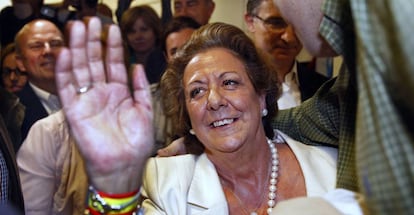Politicizing death
Discrepancy over minute of silence and excesses over Rita Barberá’s memory disrupt mourning

The lack of maturity in Spanish politics did not miss the opportunity to manifest itself at the senator’s deathbed. The passing of Rita Barberá inside a Madrid hotel room on Wednesday served as an urgent pretext to make the most out of the mourning.
This much was evidenced by the immediate reaction by former Valencian premier Alberto Fabra on radio host Carlos Alsina’s show, where he proclaimed that the death of his fellow politician would weigh heavily on the conscience of those who had condemned her while she was still alive.
Depressed and isolated. That is how Rita Barberá died
And it was also evidenced by the collective walk-out from Congress by Podemos during the minute of silence in Barberá’s memory; Podemos’ guidebook to personal conduct does not seem to differentiate between showing manners and being opportunistic.
Any occasion seems appropriate to indulge in politics, and then to justify it through arbitrary interpretations. A minute of silence does not entail a tribute of any kind. It is simply a gesture of sensitivity and institutional respect, just like shaking the king’s hand or addressing a pontiff as Your Holiness.
That is why the matter-of-fact attitude displayed by Valencian leftist party Compromís is worthy of praise. Its spokesman, Joan Baldoví, observed the minute of silence, subordinating political animosity to the need to show respect for the loss of human life. A senator was dead, and there was an empty seat in the Senate.
The Senate was the exile that Rita Barberá clinged to as she nursed her dismay at having been placed in isolation by her own party. She had been stripped of PP membership, and exposed to the political derision that the opposition demanded. Rita Barberá, once an essential prop to PM Mariano Rajoy in the wealthy fortress represented by Valencia, had lately become a nuisance.

The great leader’s Caesar-like attitude showed no mercy for Barberá. She had to be sacrificed, and she was, but this strategic decision should not be merged with spur-of-the-moment feelings, or with posthumous score-settling. We have heard former Foreign Minister José García Margallo say that Rita was betrayed by her own people, more or less as though the somatization of the betrayal had contributed to the heart attack.
We will end up hearing – as we already have by PP deputy Celia Villalobos on TV show Espejo Público – that Rita Barberá did not die, she was killed... It is one extreme manifestation of mourning. The other extreme was illustrated by Podemos, which handed down its own conviction for corruption when there hadn’t even been a trial yet.
The opinion one might have of Rita Barberá on November 23 is the same one that one might have had on November 22. News of her death requires a show of mourning and respect, but no overacting – either to make her a saint or to deny her the right to a funeral, which is what Podemos did by walking out of the lower house.
Rita Barberá represents an era of politics that is under suspicion. She was in a very delicate position in the corruption and illegal financing scandals known as Noos and Taula. And she had been through legal torment as well as public rejection from her own party.
Depressed and isolated. That is how Rita Barberá died. And while she may not be resurrected on the third or fourth day, there is no doubt that her 40 years of service in politics did deserve the epitaph of one minute of silence.
English version by Susana Urra.
Tu suscripción se está usando en otro dispositivo
¿Quieres añadir otro usuario a tu suscripción?
Si continúas leyendo en este dispositivo, no se podrá leer en el otro.
FlechaTu suscripción se está usando en otro dispositivo y solo puedes acceder a EL PAÍS desde un dispositivo a la vez.
Si quieres compartir tu cuenta, cambia tu suscripción a la modalidad Premium, así podrás añadir otro usuario. Cada uno accederá con su propia cuenta de email, lo que os permitirá personalizar vuestra experiencia en EL PAÍS.
¿Tienes una suscripción de empresa? Accede aquí para contratar más cuentas.
En el caso de no saber quién está usando tu cuenta, te recomendamos cambiar tu contraseña aquí.
Si decides continuar compartiendo tu cuenta, este mensaje se mostrará en tu dispositivo y en el de la otra persona que está usando tu cuenta de forma indefinida, afectando a tu experiencia de lectura. Puedes consultar aquí los términos y condiciones de la suscripción digital.








































